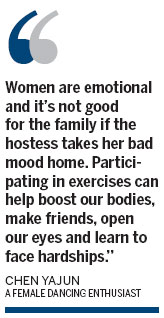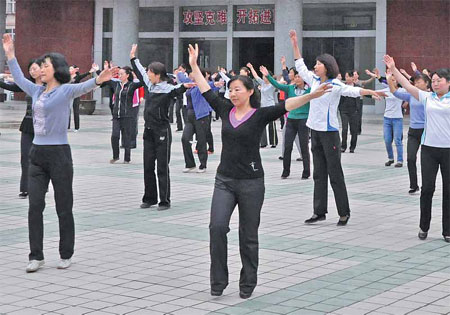Emerging from rubble
|
Locals of Zhouqu, Gansu province, dance during a morning session. Exercising has helped them recover from the agony caused when a deadly mudslide hit the county in 2010. [Provided to China Daily] |

Exercise groups are proving to be a panacea for disaster-hit Gansu county families, writes Tang Zhe
Many family members and friends perishedwhen a deadly mudslide tumbled down upon Zhouqu, Gansu province, on Aug 8, 2010.
Chen Yajun, one of the founders of a women's dance troupe in Zhouqu, still becomes tearful when recalling the devastating night which took away one of her closest dancing companions almost three years ago.
"We didn't know what was happening at first. The heavens opened up and the earth was shaking it felt like the doors of hell had opened," said the middle-aged woman. "One of our friends thought it was an earthquake and hid in a bathroom, she never came out again."
The mudslide left 1,765 people dead or missing, and destroyed many buildings and roads. A new road constructed above the main area hit by the mudslide is three storys higher than the original road.
Chen saw an apartment building of another of her friends, Wang Yulan, collapse. Luckily, Wang and her co-tenants escaped from the building and sheltered on a nearby mountain.
New residential buildings and public facilities have been built in the county over the past few years. Newly-established Fengdie District, about 15 minutes drive from the old town, boasts first-class residential and sports facilities and a kindergarten and school is close to being completed.
Despite the outward signs of recovery, the scars still run deep among the survivors.
Still, locals exercising together has proven to be a bonding experience as they try to start their lives anew. Chen was among a handful of residents who decided to restart the dance group.
"A lot of people were immersed in sorrow and fear after the catastrophe," Chen said. "People lost their homes and family members. However, by coming together can maybe provide them with a way to relieve their pain and let them to forget their sorrows even if it's only temporarily."
Established in 1998, the dancing group regularly practiced in the morning before work and in the evening after dinner. Its number had grown steadily for a decade, but all that stopped after the mudslide.
Restarting the group was not an easy task as there was little space to exercise due to most open areas being occupied by refugee tents and rescue teams. Also, not many people wanted to dance their grief away.
"Some people, especially those from the affected families, quit dancing while saying we were heartless to dance after such a disaster," Chen said.
Chen consulted the local government about whether it was appropriate to dance, and received the authority's support. The team drew about 20 participants to its first exercise session last March, and now boasts about 150 dancers every day.
Zhouqu used to only have three exercise groups before the mudslide, but now there are more than a dozen in action daily.
"Women are emotional and it's not good for the family if the hostess takes her bad mood home," Chen said. "Participating in exercises can help boost our bodies, make friends, open our eyes and learn to face hardships.
"A day is another day whether you are happy or not. Therefore I told them to stop crying, we should laugh and sing and be more positive," she said. "We take that mindset to our families and to work and slowly more and more people are emerging from the darkness."
Zhu Junling, a tai chi coach, said people had become more aware of the importance of physical fitness after the disaster.
Founded in 1993, the tai chi group lost 13 of its members in the catastrophe. It restarted its sessions three months after the mudslide and now has about 70 members exercising each day.
"We suddenly found our team was really important (after the mudslide). People were suffering and many had nothing to do. Tai chi bonded them together in those days," said Zhu, who went door to door to encourage people to come out and exercise.
"All of us lost relatives and the disaster put huge mental pressure on us," she said.
One team member, Gao Baomei, lost her son-in-law in the mudslide. She was so distraught that she could not even fasten the buttons of her clothes.
"She suffered a lot and she couldn't stop crying when we helped her with the buttons," Zhu said. "She has become a lot better since she rejoined us and is very grateful that we helped her come out and exercise.
"By doing this, we have helped, in a small way, heal the pain. We now see how deeply people cherish their lives, pay attention to their health and care about each other more after emerging from the tragedy," she said.




















